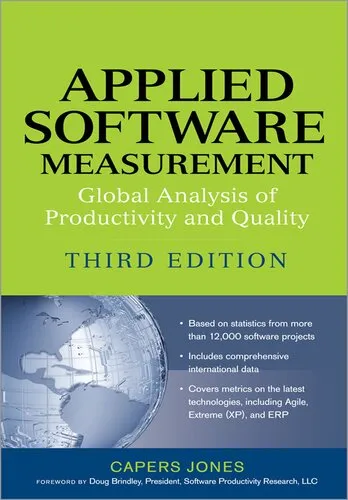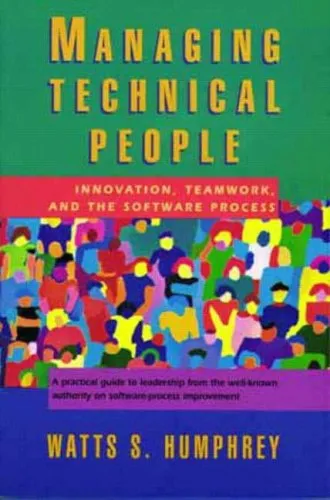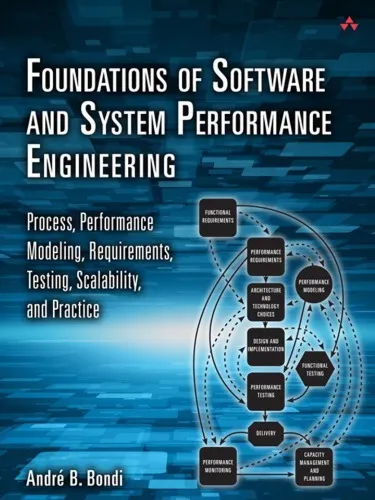Managing the Software Process
4.5
Reviews from our users

You Can Ask your questions from this book's AI after Login
Each download or ask from book AI costs 2 points. To earn more free points, please visit the Points Guide Page and complete some valuable actions.Related Refrences:
Introduction
Welcome to "Managing the Software Process", a seminal work by Watts S. Humphrey that has transformed how professionals across the software industry approach project management, process discipline, and quality assurance. Published in 1989, this book remains a cornerstone for anyone looking to systematically improve the quality of software projects, manage team productivity, and ensure successful software process implementation. As software development is inherently complex, Humphrey delves deeply into the various dimensions of managing both technical and human challenges, offering practical frameworks and strategies that resonate even decades later.
The book introduces the importance of structured software processes and emphasizes the need to establish discipline, control, and visibility throughout software development lifecycles. With a wealth of practical insights on process improvement, measurement, and planning, it serves as a guidepost for engineers, project managers, and organizational leaders aiming to manage complexity and create reliable, efficient systems.
Summary of the Book
Managing the Software Process is divided into several meticulously-crafted sections, each addressing distinct aspects of software process management. The central thesis revolves around the principle that a well-defined and consistently managed software process is critical to achieving better software quality, reducing costs, and meeting schedules.
Humphrey introduces the Software Process Maturity framework, now widely recognized as the genesis of models like the Capability Maturity Model (CMM). Through this framework, the book provides readers with tools to evaluate the maturity of their organization's software processes and offers a roadmap for progressing to higher levels of maturity. This maturity, according to Humphrey, enables organizations to effectively manage the complexity and risks endemic to software projects.
Throughout the book, you will find detailed explanations of key practices such as planning, estimation, management, and quality control, complemented by case studies and real-world examples. Humphrey’s focus on quantitative measurement provides readers with a systematic way to pinpoint problems and track progress.
Another significant component of the book is its exploration of team dynamics, communication, and the roles and responsibilities within a software development group. Humphrey highlights the importance of buy-in from all stakeholders and encourages leaders to foster a collaborative, disciplined, improvement-oriented culture within their teams.
Key Takeaways
- The Importance of Process: A well-defined, repeatable process is crucial for producing high-quality software consistently.
- Software Process Maturity: Organizations develop over time, and achieving higher levels of process maturity can significantly improve outcomes.
- Metrics-Driven Decisions: Measurement and data analysis are central to identifying bottlenecks and improving processes.
- Iterative Improvement: Continuous process assessment and incremental changes bring long-term value and foster organizational growth.
- Leadership and Responsibility: Effective software process management requires engaged leadership, clear accountability, and team commitment.
Famous Quotes from the Book
"The mature organization is not risk-free, but it is consistently able to manage the risks it encounters."
"Without data, you are just another person with an opinion."
"If you don’t know where you are, it is difficult to determine where you are going."
Why This Book Matters
Managing the Software Process is not just a book for software engineers; it is a strategic guide for anyone involved in complex project management and quality assurance across industries. In today’s fast-paced, technology-driven world, the principles outlined in this book are more relevant than ever.
By emphasizing process maturity and discipline, Humphrey provides a timeless framework that organizations can leverage to build a foundation of excellence. Whether you are an engineer looking to understand how your work contributes to the broader system, a manager aiming to streamline team operations, or an executive focused on improving organizational capacity, this book offers actionable advice tailored to every level.
Furthermore, Humphrey’s concepts, such as measurement-based improvement and a systematic approach to problem-solving, have laid the groundwork for modern project management certifications and methodologies. Additionally, the book inspires professionals to think critically about how decisions—large and small—directly impact software quality, customer satisfaction, and team morale.
Free Direct Download
You Can Download this book after Login
Accessing books through legal platforms and public libraries not only supports the rights of authors and publishers but also contributes to the sustainability of reading culture. Before downloading, please take a moment to consider these options.
Find this book on other platforms:
WorldCat helps you find books in libraries worldwide.
See ratings, reviews, and discussions on Goodreads.
Find and buy rare or used books on AbeBooks.
1680
بازدید4.5
امتیاز0
نظر98%
رضایتReviews:
4.5
Based on 0 users review
Questions & Answers
Ask questions about this book or help others by answering
No questions yet. Be the first to ask!














